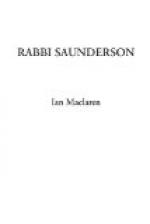“Can you receive another tramp and give him a bed? for I am in low spirits, and so, like every other person in trouble, I come to you, you dear old saint, and already I feel a better man.”
“Receive you, John? It is doubtless selfish, but it is not given to you to know how I weary to see your faces, and we shall have much converse together—there are some points I would like your opinion on—but first of all, after a slight refreshment, we must go to Mains: behold the aid to memory I have designed”—and the Rabbi pointed to a large square of paper hung above Chrysostom, with “Farewell, George Pitillo, 3 o’clock.” “He is the son’s son of my benefactor, and he leaves his father’s house this day to go into a strange land across the sea: I had a service last night at Mains, and expounded the departure of Abraham, but only slightly, being somewhat affected through the weakness of the flesh. There was a covenant made between the young man and myself, that I should meet him at the crossing of the roads to-day, and it is in my mind to leave a parable with him against the power of this present world.”
Then the Rabbi fell into a meditation till the dog-cart came up, Mains and his wife in the front and George alone in the back, making a brave show of indifference.
“George,” said the Rabbi, looking across the field and speaking as to himself, “we shall not meet again in this world, and in a short space they will bury me in Kilbogie kirkyard, but it will not be in me to lie still for thinking of the people I have loved. So it will come to pass that I may rise—you have ears to understand, George—and I will inquire of him that taketh charge of the dead about many and how it fares with them.”
[Illustration: “We shall not meet again in this world.”]
“And George Pitillo, what of him, Andrew?
“’Oh, it’s a peety you didna live langer, Mr. Saunderson, for George hes risen in the warld and made a great fortune.’
“How does it go with his soul, Andrew?
“’Well, you see, Mister Saunderson, George hes hed many things to think about, and he maybe hasna hed time for releegion yet, but nae doot he’ll be turnin’ his mind that wy soon.’
“Poor George, that I baptized and admitted to the Sacrament and . . . loved: exchanged his soul for the world.”
The sun was setting fast, and the landscape—bare stubble-fields, leafless trees, still water, long, empty road—was of a blood-red colour fearsome to behold, so that no one spake, and the horse chafing his bit made the only sound.
Then the Rabbi began again.
“And George Pitillo—tell me, Andrew?
“’Weel, ye see, Mister Saunderson, ye wud be sorry for him, for you and he were aye chief; he’s keepit a gude name an’ workit hard, but hesna made muckle o’ this warld.’
“And his soul, Andrew?
“‘Oo, that’s a’ richt; gin we a’ hed as gude a chance for the next warld as George Pitillo we micht be satisfied.’




